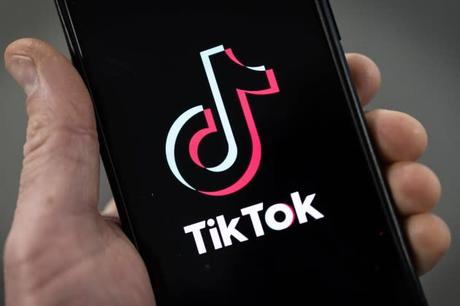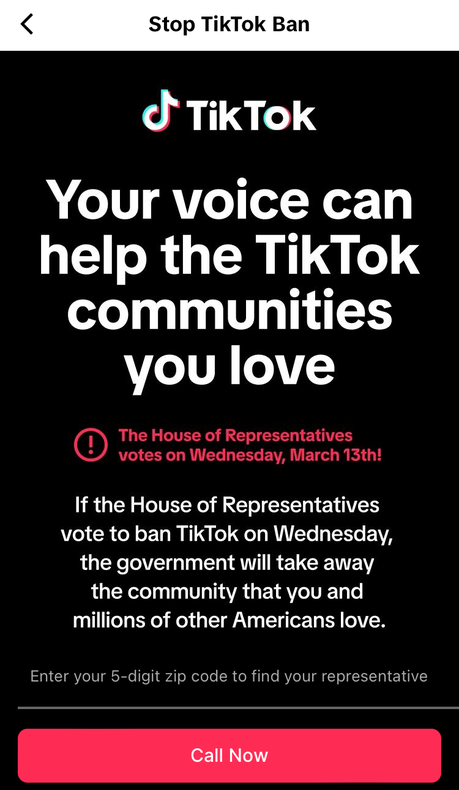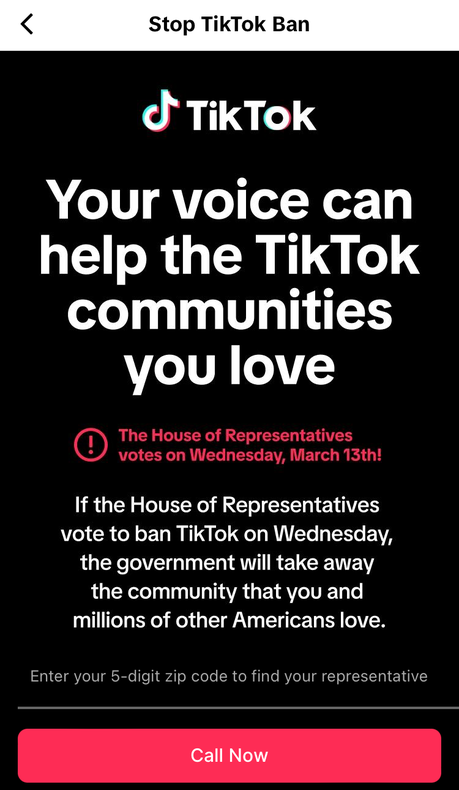
The House of Representatives has passed a bill by a wide margin that would make it illegal to distribute or host TikTok in the US - effectively blocking it from some 170 million US users - unless Chinese owner ByteDance withdraws its stake in repels the popular app.
This is the first time that a bill has been passed in Congress banning an internet app. The fear among many U.S. lawmakers, who see TikTok as a national security threat: that the Chinese regime could demand access to data about TikTok's U.S. users or somehow force it to promote China's agenda. TikTok has repeatedly claimed that the Chinese government has never made such demands (and that TikTok would not comply if they were made).
More from VarietyThe bill, called the Protecting Americans From Foreign Adversary Controlled Applications Act, passed the House of Representatives on a 352-65 vote Wednesday morning with bipartisan support, amid opposition from some representatives on both sides of the aisle. aisle. That came after the bill was fast-tracked under a "suspension of the rules" schedule, which required a two-thirds majority. While the measure received strong support in the House of Representatives, its fate in the Senate is unclear as there is currently no corresponding legislation on the table.
President Biden has said he would sign the bill if it reaches his desk - even as his reelection campaign just launched an account on TikTok, @bidenhq, on Super Bowl Sunday last month. Biden approved a measure in 2022 banning TikTok on most US government devices.
If the legislation is passed into law, it is expected to face legal challenges, possibly including from TikTok. Previous attempts in the US to ban TikTok have so far failed on First Amendment grounds and because courts ruled that legal challenges raised only hypothetical national security risks rather than actual evidence that TikTok shared data with Chinese authorities.
The story continues
The threat of a US TikTok ban would escalate tensions between the US and China. Chinese officials have said the government would "strongly oppose" any forced sale of TikTok as it would "seriously undermine the confidence of investors from various countries, including China, to invest in the United States." According to China's Ministry of Commerce, ByteDance's sale of its TikTok property would represent a technology export and be subject to government approval. "You won't be able to force ByteDance to divest," James Lewis, SVP at the Center for Strategic and International Studies, told the New York Times.
The bill was introduced on March 5 by Rep. Mike Gallagher (R-Wis.) and Rep. Raja Krishnamoorthi (D-Ill.), and was unanimously approved by a House committee on a 50-0 vote. Under the bill, Apple and Google's app stores and web hosting services in the US would be barred from hosting any "foreign adversary-controlled application," specifically mentioning ByteDance's TikTok, according to the text of the bill (HR 7521) . The ban would take effect unless such "foreign adversary" (i.e. ByteDance) divests its ownership of the app (i.e. TikTok) within 165 days of it becoming law. In addition, the bill gives the US president leeway to determine which apps operated by hostile foreign governments should be subject to the divestiture requirement.
"This is my message to TikTok: Break up with the Chinese Communist Party or lose access to your American users," said Gallagher, chairman of the House Select Committee on the Strategic Competition Between the United States and the Chinese Communist Party, in the introduction of the bill.
Violators of the TikTok ban would face stiff fines of up to $5,000 multiplied by each U.S. user "determined to have opened, maintained, or updated an application controlled by a foreign adversary."
A TikTok representative said in a statement after the vote: "This process was secret and the bill was blocked for one reason: it is a ban based on zero evidence. We are hopeful that the Senate will consider the facts, listen to their constituents and realize the impact on the economy, on 7 million small businesses and on the 170 million Americans who use our service."
Ahead of the vote in the House of Representatives, Chinese Foreign Ministry spokesman Wang Wenbin called the legislative action "bullying behavior" that "harms the normal international economic and trade order," according to a BBC report. "In the end, this will inevitably come back to bite the United States itself."


On Tuesday, TikTok sent another in-app alert to users in the US, urging them to call their congressional representatives to express their opposition to the bill, after issuing a similar alert last week before the vote in the committee of the House of Representatives. "Your voice can help the TikTok communities you love," the message read, similar to another message it sent last week. It allowed users to look up their zip code to get a phone number for their local representative. Some House members cited TikTok's mobilization of users in its lobbying campaign as illustrative of its power - and a clear reason why the bill should become law.
TikTok has repeatedly emphasized that it is in no way controlled or owned by the Chinese Communist Party or any other government entity. According to TikTok, about 60% of ByteDance is owned by "global institutional investors" including BlackRock, General Atlantic, Susquehanna International Group and Sequoia, with 20% owned by the company's Chinese founders and 20% owned by other employees.
During a House committee hearing last year, TikTok CEO Shou Zi Chew claimed that forcing ByteDance to divest its ownership stake in the app would not change the way TikTok operates. "A change of ownership would not impose new restrictions on data flows or access," he said. "All global businesses face common challenges that must be addressed through safeguards and transparency."
In the Senate, Senator Chuck Schumer (D-N.Y.), the majority leader, has not committed to putting a TikTok ban bill to a vote. Additionally, Sen. Rand Paul (R-Ky.) told the Washington Post that he will block any measure he believes is unconstitutional. "I don't think Congress should try to take away First Amendment rights [170] million Americans," Paul said.
Meanwhile, Donald Trump, who as president tried unsuccessfully to force ByteDance to sell its majority stake in TikTok to American owners, has weighed in on current efforts to block TikTok or have its Chinese owners sell their stake in the app. Last week he posted on Truth Social: "If you get rid of TikTok, Facebook and Zuckerschmuck will double their revenue," calling Facebook "a true enemy of the people!" mentioned. In a CNBC interview Monday, Trump agreed that TikTok's Chinese ties pose "a national security risk" but reiterated his point that a U.S. government ban on the app would only help Facebook.
"Honestly, there are a lot of people on TikTok who love it. There are a lot of young kids on TikTok who will go crazy without TikTok," Trump said on CNBC. "There are many users. There's a lot of good and a lot of bad with TikTok. But what I don't like is that without TikTok you can make Facebook bigger and I consider Facebook an enemy of the people, along with a large part of the media."
Best of varietySign up for the Variété newsletter. For the latest news, follow us on Facebook, Twitter and Instagram.
